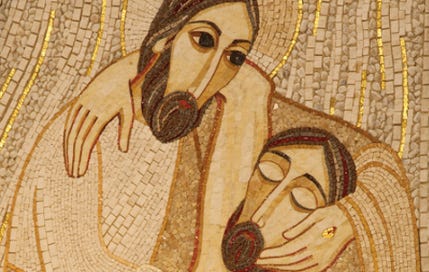A few weeks ago, I changed the name of this publication from “Kevin’s Substack” to “Who is My Neighbor?” It seems a pretty natural fit—the parable from which that phrase comes, the Good Samaritan, is a common destination for Christians who try to take a compassionate and helping response to people typically designated as “outsiders.” You may think that with a title such as this I’m calling us to good neighborliness with people experiencing homelessness.
And, well, yes. I am. But I actually think this story is more radical than that.
For my readers with less Bible-experience, I will briefly summarize the story: a man asks Jesus what the greatest commandment is, and Jesus responds to love God and love neighbor. The man then asks, “Who is my neighbor?” So Jesus tells a story about a man who was traveling along a dangerous road and is beaten, robbed, and left for dead. Two religious leaders separately pass the man and do not stop to help, but a Samaritan (historically ideological enemies/outsiders to Jesus’ listeners) not only stops to help, but absorbs the financial cost of the man’s care. Jesus then asks the questioner, “Who was a neighbor to the man left for dead.” The asker replies, “The one who helped,” to which Jesus replies, “Go and do likewise.”
When we typically read this story, we hear the command as “Be like the helpful Samaritan and care for people in need, even if you don’t like them!” The charity “Samaritan’s Purse” derives its name from this reading; even the fact that we call the story “The Good Samaritan” and have laws in cities designed to protect helpers called “Good Samaritan Laws” reinforce this reading.
But consider this: If that was the point of the story, why didn’t Jesus make the victim the Samaritan?
That would be the way to tell it to make that point. Of course the religious leaders pass him by, he’s an outsider. But the compassionate one is the one that stops and helps the outsider. We should be like that, right?
But that’s not the story, and this is where it gets even more radical. The “outsider” is the hero of the story, and the listener is put in the vulnerable position of receiving care from them.
The command is not merely to help those who are outsiders. That would be the reading if the listeners were the Samaritan. But the man asked “Who is my neighbor?” and Jesus said the neighbor is the Samaritan who stopped to help you.
It’s not a story about compassion or charity. It’s a story that confronts the entire way we label individuals and structure societies based on those valuations. This parable radically reorients our understanding of who the helpers are and who needs to receive help. It asks those of us in privileged positions to take the seat of vulnerability and find our place—perhaps even our salvation—in communion with those our merit-based society have deemed as non-valuable or less-human.
The point of the “Good Samaritan” isn’t to be good like the Samaritan—it’s to recognize the inherent goodness of Samaritans—particularly in contrast to the hypocritical religious people. (OOF!)
So when you see the title of this Substack, “Who is My Neighbor?” come to your inbox, remember: When it comes to ending homelessness, we don’t need saviors—we need humble, vulnerable people willing to sit in communal solidarity with those experiencing homelessness and pursue our collective flourishing together.
I will leave you with these words, which I believe to be (unintentionally) the best interpretation of this parable, by artist and abolitionist Lilla Watson:
If you have come here to help me you are wasting your time, but if you have come because your liberation is bound up with mine, then let us work together.
These posts will always be free.
But the rest of my work—traveling to preach and lead workshops, creating content, and getting into sacred mischief through advocacy and direct aid—is enabled and expanded by your support. Consider becoming a Paid subscriber to enhance my reach.





This parable has meant so much more to me after realizing that I'm not the good Samaritan! My takeaway has been that we have to be open to receive help from the people we always figured we were better than. That receiving help might lead us toward mutual work for liberation seems like exactly the place Jesus would want to lead us!
Something I have pondered with this story a few times is that the men that pass him by are within their legal rights to do so. The man was bleeding by the side of the road. If one under the law would touch him, then he would be unclean. Thus he would be unable to preform whatever tasks he had to that day. He would have to wait the prescribed period of time before reengaging his community. I think there is something in this story that Jesus wants us to also learn about strict obedience to rules and lacking compassion.